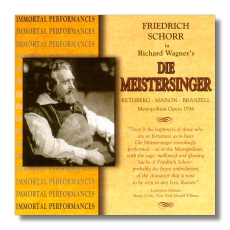
The Internet's Premier Classical Music Source
Related Links
- Wagner Reviews
- Latest Reviews
- More Reviews
-
By Composer
-
Collections
DVD & Blu-ray
Books
Concert Reviews
Articles/Interviews
Software
Audio
Search Amazon
Recommended Links
Site News
 CD Review
CD Review
Richard Wagner

Die Meistersinger von Nürnberg
- Friedrich Schorr
- Elisabeth Rethberg
- Rene Maison
- Eduard Habich
- Karin Branzell
- Emanuel List
Orchestra & Chorus of the Metropolitan Opera/Arthur Bodanzky
Guild GHCD2244/7 4CDs 263m ADD
Guild continues to thrill all serious historical collectors with their stunningly produced resurrections from the vast and unique library of the Metropolitan Opera. After having given us a complete "Dream Ring", they now turn their attentions to a magnificent 1936 broadcast of the monumental "Die Meistersinger von Nürnberg" with Friedrich Schorr at the absolute peak of his prime.
The usual glitches apart, this set can confidently be recommended as the finest "Meistersinger" ever recorded. As far as I can discover, it is complete from first note to last and the array of singers assembled here almost beggars belief. Friedrich Schorr is absolutely unimpeachable as Hans Sachs, he is a cajoling, pleading, authoritative gentleman with a titanic voice that almost bursts through the crackly radio sound.
[From the booklet notes: "The performance is itself is afflicted by what seems like a thousand of those infamous Bodanzky cuts. These are not only of one or another substantial passage but of stanzas and sometimes single lines. To detail them all would require far more space than is available but it can be said here that besides numerous cuts in Act I (much of David's music), the second verse of Sachs' Jerum is omitted, followed by large cuts in the Sachs-Beckmesser passage. Act III is riddled with cuts including a portion of the Walther-Sachs scene (from Doch lehrt es wohl den zauberspruch to Doch lasst dem Ruh followed by the second half of Walther's Morgenlied. Beckmesser's passages are repeatedly sliced away, as is Sachs' imme schustern and all of Hat man dem Schuhwerk, cutting to Eva's O Sachs mein freund.
Then in Act III the complete second stanza of Walther's Preislied is omitted and worse of all, the central passage connected with the humanity and gentle wisdom of Sachs, his contemplative response to the acclaim of the crowd Euch macht ihr's leicht is jarringly cut, of which only eight lines survive. As a result, this ends the great oration before it is barely begun. This is so painful to endure and does such injury to Schorr's celebrated characterization of Sachs that we have seamlessly interpolated the missing music from Schorr's 1931 commercial disc (Vic. 7682) altered in sonics to fit the acoustic of this broadcast." -Ed.]
But Schorr is not alone in greatness. The opera is conducted by the much underrated Arthur Bodanzky, a great conductor in all departments and there is also Elisabeth Rethberg. By all accounts, this is an Eva for all time and the combination of all three artists is absolutely beyond reproach. Habich's Beckmesser is also unforgettable as are the other smaller roles taken by Maison, Branzell and List's delightful Pogner.
I grew up with Karajan's 1971 Dresden version and find his 1951 Bayreuth recording much overrated. Solti's recordings are slightly flawed and Kempe's genial 1958 version with the Berlin Philharmonic Orchestra remains my firm favourite. However, this new version will win pride of place amongst my growing Wagnerian collection for its unique sense of occasion and its sense of a live recording that is quite remarkable.
Copyright © 2003, Gerald Fenech


















